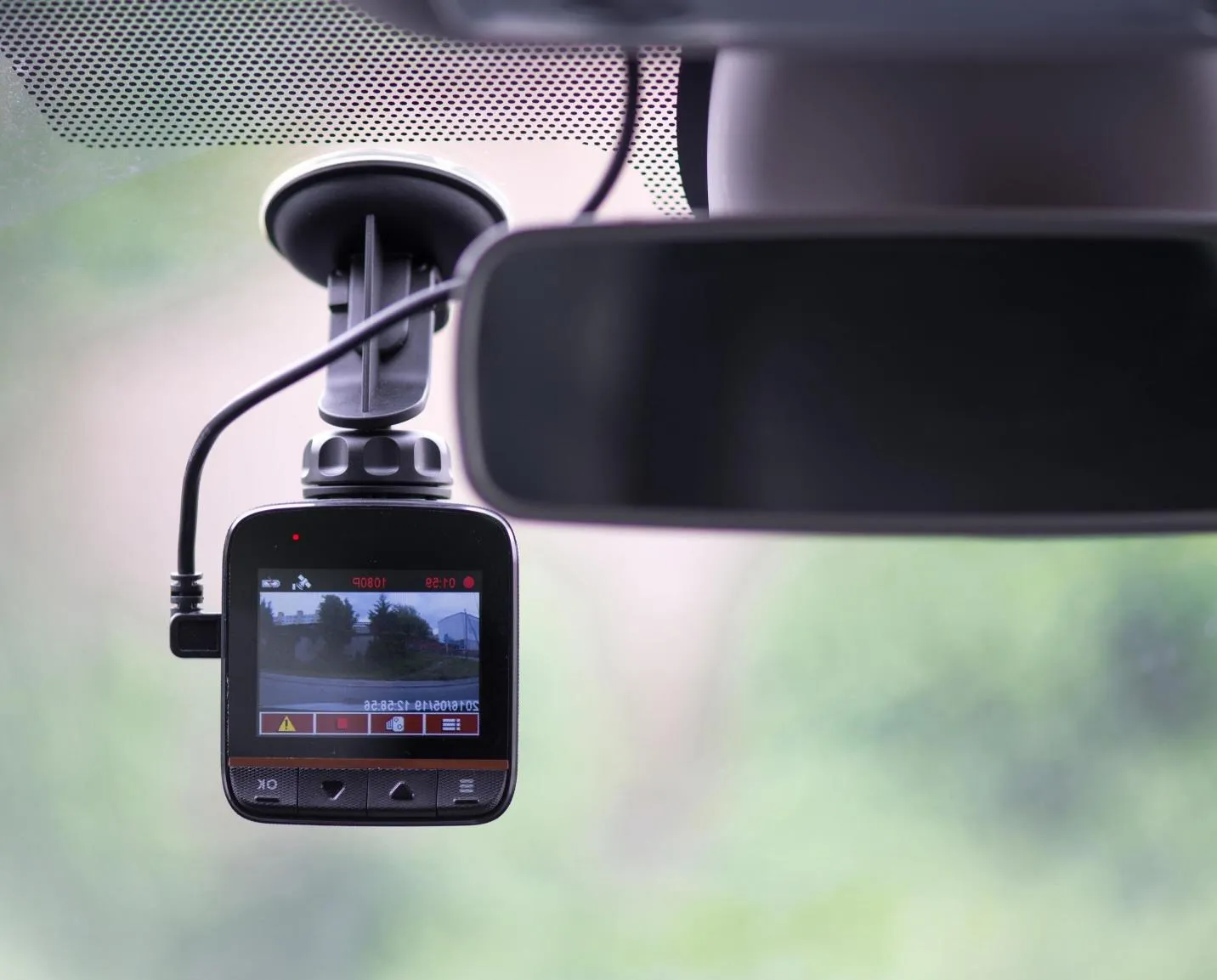Look a little more closely at the windscreens and even the rear windows of cars, vans and other vehicles and it won’t take long before a dash cam is spotted. Influenced by ‘crash for cash’ scams, concerns over uninsured drivers on the road, fears surrounding ‘relay theft’ of cars with keyless entry, and by motorists’ and fleets’ general and understandable keenness to reduce their insurance premiums, dash cams are becoming increasingly popular in the UK, estimated to be home to between two1 and three2 million, and in other countries including Japan and Taiwan.
INCREASINGLY WIDESPREAD IN TODAY’S VEHICLES WORLDWIDE
Dash cams were reportedly slower to gain traction among private drivers in the U.S. than in other regions such as China and Russia where millions of motorists had already adopted them by as early as 2005 for “various legal and cultural” reasons3 and the percentage4 is now reportedly 1 in 3. As Bill Gremminger, an early advocate of dash cam technology succinctly put it, “video is the great equalizer. It does not lie”, and the price of early models deterring the technology’s initial adoption in the United States was unsurprisingly quickly negated, with the global average price now around 60% cheaper5. “A surge in popularity and big steps in technology have led to a price drop, and a reduction in size, so they are now affordable for most of us”, commented GEM Motoring Assist.
The Insurance Council of Australia6 recently identified that 7% of the country’s drivers use a dash cam and 13% of the remainder intend to install one within the next twelve months, motivated by the desire to combat vehicle vandalism, theft and accidents by using this relatively cheap method of car CCTV. One of the market’s primary manufacturers has reported that ‘rear-ending’ is the most frequent type of accident in Australia, and although not all insurers accept footage in claims, drivers not at-fault are increasingly being enabled to prove their innocence. Motorcycle riders, too, are embracing dash cam systems.
Various OEMs are adding dash cams to certain of their models’ options lists, such as the DS ConnectedCAM suite available for the DS 7 Crossback7, and LeasePlan8, one of the contract hire and leasing sector’s main funders, introduced a driver pack in 2017 that includes a dash cam intended to provide drivers of its leased vehicles with peace of mind and the ability to capture the unexpected.
Last month, Nippon Rent-A-Car9 in Japan took the decision to install dashboard cameras in all new vehicles introduced to its fleet, with the aim of each one being fitted with a unit by 2021 compared to 40% of its assets as of April 2019. We envisage many more vehicle rental companies following suit, both in their own interests and particularly those of their customers who may be increasingly concerned over collision and damage charges and hence keen to prove liability.
SENTIMENT AND QUESTIONS SURROUNDING IN-CAR DVRS
A survey10 commissioned by a leading car insurance aggregator and comparison site in Q4 2018 revealed that 25% of drivers would specifically welcome a move by legislators to make dashcams compulsory in all cars whatever their age, while 32% expressed the desire to see them mandatorily fitted to all new cars. Just 8% perceive dash cams negatively, 44% of them feeling that their privacy would be encroached upon, while 7% fear that their poor driving skills would be evidenced by a dash cam.
Unlike telematics systems, of which IMS is a leading innovator, dash cams are not used by motor insurers to monitor a driver’s overall driving performance and behaviour, though, assuaging any misconceptions in this regard and showing that the two technologies are complementary. As a company with road safety at the heart of our products and solutions, we were encouraged that 30% of the small number who are apathetic to adopting a dash cam based their view on the potential for such systems to cause driver distraction.
At a time when plug-in hybrid and fully electric cars are being widely promoted, along with their sometimes complicated charging infrastructure, enhanced educational awareness over dash cams may be something that manufacturers and other motoring organisations would be advised to promote. For instance, an HonestJohn11 reader raised the perfectly valid question over whether a dash cam will deplete the battery in a PHEV. The answer is that the vehicle’s main lithium-ion battery won’t be affected but its 12V cell will be, although only negligibly, as dash cams do not onerously drain power from a car’s systems – but other motorists less familiar with technology may be left wondering the same.
ADVANCES IN DASH CAM TECHNOLOGY
Consumer articles on the subject are in abundance, such as Which?’s “Is it worth buying a cheap dash cam?”12, and highlight just how advanced dash cam technology has become, with some of the latest and more expensive iterations offering features from Quad HD and 2K recording quality, G-force sensors, intelligent detection of when the vehicle is parked, and automatic contacting of emergency services, to forward and rear-facing recording, plus fatigue, headlight and speed reminders – which we particularly welcome from a road safety perspective.
Certain leading dash cam brands systematically record 10-second high-definition clips immediately after detecting an impact and then simultaneously upload the video to a cloud server via 4G or 5G while emailing a first notification of loss or ‘FNOL’ email alert to the insurance broker or underwriter13.
ARE DASH CAMS PROVING EFFECTIVE?
As of Q4 2017, Accident Exchange (AX) reported a 285% increase in claims submitted including dash cam footage. NextBase, a leading manufacturer of dash cams, launched the National Dashcam Safety Portal14 (NDSP) in Q4 2018 in response to what it called ‘growing public demand’ by motorists to be able to report incidents of dangerous or unlawful driving by uploading footage directly for the attention of the relevant police force(s)15.

By July 2019, 1,223 drivers have reportedly been prosecuted using data comprising 4,891 clips from the NDSP, which 22 of the UK’s police forces calculate to have saved them 68,474 hours of human evidence-processing time pertaining to claims or dangerous driving having been witnessed and recorded16.
Forces such as West Mercia have augmented their own road safety and responsible driving campaigns with use of the NDSP, while Northumbria Police, for example, have commented that NextBase’s database “reduces the demand on [their] communications centre by providing a quick and easy solution for the public to upload footage”, which they say exemplifies ‘modern policing.’
We agree with voices such as the AA, though, that are keen to discourage ‘dashcam vigilantes’ and an increase in motorists effectively spying on one another in a way that breeds suspicion, or going to other extreme lengths to catch erratic drivers or prove their innocence.
A survey17 by LeasePlan identified that 77% of respondents perceived dash cams as a technology that would boost driver safety, but AXA, Towergate and a number of other bodies reported in December 2017 that many fleets have been disappointed that their motor premiums haven’t reduced by default following the installation of dash cams.
Almost a year after, though, and Kings Security Systems reported to Fleet News18 that following introducing dash cams to its 190 vehicles along with online driver assessments, incidents have reduced by 53% and the company’s annual insurance premium by £10,000, leading them to comment that the ‘heavy investment’ has proved a ‘no-brainer’.
FLEETS, DASH CAMS AND GDPR
It’s fair to say that the advent of Global Data Protection Regulation (GDPR), although very positive in its intentions, impacted organisations large and small, including those operating vehicle fleets. When it comes to the use of dash cams, anyone travelling in the car in addition to the driver must be informed that audio is being recorded19, which in the case of internal and rear-facing cameras may also include video. Any audio and/or video recorded of a person constitutes personal data, for which there must be a clearly defined and legally justifiable purpose. Storage of such data must be secure and unaltered, with access only granted to authorised persons19b.
Fleet drivers and other personnel who undertake journeys in vehicles fitted with a dash cam shouldn’t delete any footage as doing so could constitute an offence, particularly if a collision or another police incident requires submissions of such. ‘Grey fleet’ private vehicles used for at-work driving are also covered by relevant legislation pertaining to disclaimers, tampering and other aspects of dash cam usage.

Road safety including visibility must also be upheld when using such technology, with onus placed on each fleet driver to ensure that the dash cam is suitably positioned so as not to impede their view and manoeuvrability, and this should be encompassed in each periodic inspection by the fleet manager. Best practice advice recommends installing a dash cam behind or just underneath the rear-view mirror on the passenger side.
For company car, van and lorry drivers who need to travel abroad, it’s important to note that dash cams are banned in certain European countries including Austria and Portugal, while France, Germany and others restrict their usage much more than in the UK where they are relatively freely allowed.
THE FUTURE OF DASH CAMS
In-car video recording technology is expected to soon become much more common in the U.S., where we and others anticipate insurers beginning to offer drivers of vehicles with dash cams installed a discount against their premiums, which is something many motorists in China, Europe, Russia and other regions have already become more and more accustomed to over recent years. Chris Kooistra, Cedar Electronics’ senior director of brand partnerships, explained to Investor’s Business Daily that motor insurers in the U.S. do typically accept footage from dash cams, though20.
With mobility as a service (MaaS) and vehicle usership rather than ownership models growing around the world, ride-sharing platforms such as Lyft and Uber are predicted to stipulate front and rear-facing cameras in their vehicles, providing invaluable footage of the road ahead and behind along with interior video that would form evidence for any passenger disputes.
The chauffeur segment21 is also considering whether dash cams are relevant to executive drivers, and such a move is probably inevitable eventually for the same safety and financial reasons that motivate many private drivers and business fleets. However, chauffeuring clients often of high or ultra-high net worth status introduces elevated security and privacy concerns regarding conversations and locations, so more dialogue will be needed before luxury car hire firms and their drivers face dash cams becoming prevalent.
Potholes are synonymous with driving in many countries, the UK no exception, and we can envisage a time when road condition and pothole monitoring technologies such as the system from Finnish AI firm Vaisala are amalgamated into consumer products. Unlike laser-based road degradation sensors, Vaisala’s system, which is being trialled by Suffolk Highways, uses internal cameras very similar to dash cams, which aren’t as affected by wet weather and narrow roads and are also more cost-effective22.
DASH CAM USAGE IS ONLY SET TO GROW FURTHER OVER COMING YEARS AND BECOME INCREASINGLY AMALGAMATED WITH OTHER AUTOMOTIVE SYSTEMS INCLUDING TELEMATICS, VOICE CONTROL AND CONNECTED TECHNOLOGIES, WITH WIDE-RANGING BENEFICIARIES FROM INSURERS AND POLICE FORCES TO PRIVATE AND FLEET DRIVERS, ALONG WITH THE ENSUING ROAD SAFETY BENEFITS.
Sources:
1. https://www.carbuyer.co.uk/tips-and-advice/169409/best-dash-cams-2019
3. https://www.sfchronicle.com/business/article/Why-Americans-don-t-use-dash-cams-6067560.php
4. https://www.buyautoparts.com/blog/dash-cams-are-they-worth-the-investment/
5. https://www.marketwatch.com/press-release/at-173-cagr-car-dashcam-market-size-poised-to-touch-usd-5380-million-by-2024-2019-05-09
6. https://thewest.com.au/lifestyle/motoring/switched-on-to-dash-cams-ng-b881251847z
7. https://fleetworld.co.uk/ds-adds-built-in-dash-cam-option-to-ds-7-range/
9. https://www.autorentalnews.com/333597/nippon-rent-a-car-to-install-dashcams-on-all-new-vehicles
11. https://kit.honestjohn.co.uk/askhj/answer/130053/will-a-dashcam-deplete-the-battery-in-a-phev-
12. https://www.which.co.uk/news/2019/08/is-it-worth-buying-a-cheap-dash-cam/
13. https://fleetworld.co.uk/innovation-vehicle-cameras/
14. https://www.nextbase.com/en-gb/national-dash-cam-safety-portal/
15. http://smarthighways.net/nextbase-launches-national-dashcam-safety-portal-for-the-uk/
19. https://www.fleetpoint.org/camera-systems/dash-cams-and-the-law-what-you-need-to-know/
19b. https://fleetworld.co.uk/dashcams-and-gdpr-what-fleets-need-to-know/
21. http://www.thechauffeur.com/should-all-chauffeurs-consider-dash-cams/
22. https://www.edp24.co.uk/news/politics/dashcams-used-to-spot-potholes-in-suffolk-1-6171650



